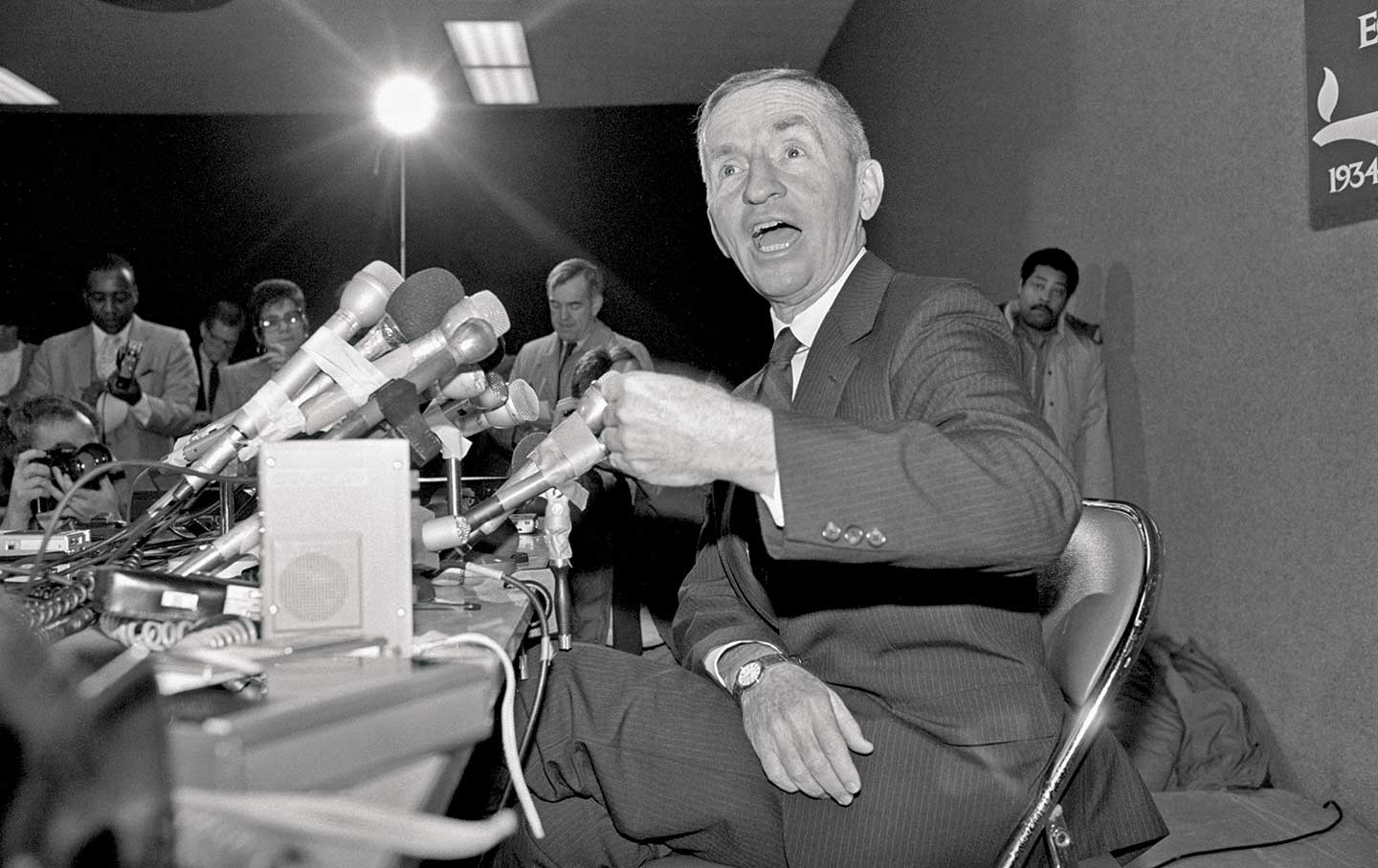Hit Dogs Holler: What the Backlash Against Jonathan Glazer Says About Israel’s Defenders
The Zone of Interest was never a film of purely historical relevance. But when the director made that obvious in his Oscar acceptance, supporters of Israel’s war in Gaza erupted.

When director Jonathan Glazer won the Oscar for Best Foreign Film for The Zone of Interest earlier this month, he used his acceptance speech to deliver the night’s sole statement on the war in Gaza in front of a global audience. After noting that his film—which depicts the quotidian life of Auschwitz commandant Rudolf Höss and his wife and children in their home outside the gates of the concentration camp—is intended to be as much about the present as the past, Glazer, trembling, said this: “Right now we stand here as men who refute their Jewishness and the Holocaust being hijacked by an occupation which has led to conflict for so many innocent people.”
Though many viewers misunderstood the awkwardly worded statement—some innocently, others deliberately—its plain meaning was that Glazer and the other predominantly Jewish men involved in producing The Zone of Interest were speaking out against Israel’s assault on Gaza, and were doing so as Jews. Far from refuting their Jewishness—as some of their critics would claim—Glazer was rather speaking againt the abuse of Jewish identity in the service of a brutal war against Palestinian civilians.
At least some in the ceremony’s audience of Hollywood A-listers applauded Glazer, but the subsequent backlash has been louder. On social media, the reaction from right-wing supporters of Israel was perhaps best summed up by Commentary editor in chief John Podhoretz, who tweeted, “Jonathan Glazer, you can go fuck yourself and stuff your Oscar up your ass.” To Podhoretz and his neoconservative ilk, Glazer instantly became the most prominent example of what Commentary contributor Eli Lake recently termed an “AsAJew”—that is, a Jew who weaponizes their Jewish identity to criticize Israel and Zionism. The slur, which Lake has also directed against Peter Beinart, Jewish Voice for Peace, and Norman Finkelstein, is essentially an updated version of the older terms “self-hating Jew” and “kapo.” Writing in The New York Times this week, Bret Stephens called Lake’s “AsAJew” essay “brilliant” and added, in reference to Glazer, “Having once had a bar or bat mitzvah does not make one a spokesperson for Jews, much less an authority on the Middle East.”
Yet it’s clear Glazer’s remarks struck a nerve. Earlier this week, over 1,000 Jewish creatives in the film industry signed an open letter denouncing his remarks and denying the very existence of an “occupation.” While the list of signers included a handful of notable names like Debra Messing, Jennifer Jason Leigh, and Tovah Feldshuh, it’s remarkable how many prominent Jews in Hollywood didn’t sign; several, including Tony Kushner and Jesse Peretz, have defended Glazer. The speech has also prompted some incoherent reconsideration of The Zone of Interest itself, which was made entirely before the war in Gaza and has only retroactively come to be associated with it. On Tuesday, CNN published a piece by Peter Rutland, a professor of government at Wesleyan, arguing that “in some important respects, the film is even more troubling than Glazer’s speech.” Rutland went on to demonstrate a basic lack of understanding of both The Zone of Interest and of Hannah Arendt’s concept of “the banality of evil,” which the film clearly draws upon. “Arendt was wrong,” Rutland wrote, adding, “Höss was not just a bored bureaucrat and family man. He was a fanatical Nazi.”
It’s telling that Rutland sees any contradiction there. Höss, as portrayed in the film, is indeed a bored bureaucrat, a family man—and a fanatical Nazi all at once. His wife, Hedwig, is likewise a typical hausfrau and a fanatical Nazi. The Zone of Interest makes a lot of critics uncomfortable because it dares to suggest that ordinary people can be actively, willfully complicit in genocide. Arendt’s own famous reporting on Adolf Eichmann’s trial is often misunderstood in this exact way; it was Eichmann himself who disingenuously maintained that he was just following orders by way of defense. “The banality of evil” doesn’t mean that bored bureaucrats follow genocidal orders unthinkingly, and doesn’t preclude their agreeing with the substance of those orders.
Glazer’s artistic intent with The Zone of Interest clearly flew right over the head of, for instance, New York Times film critic Manohla Dargis, who began her review by asking, “What is the point of ‘The Zone of Interest’?” and later calls it “a blunt, obvious movie.” Others, like former Anti-Defamation League director Abraham Foxman, seemed initially to appreciate the film as a commemoration of the Holocaust—then balked at Glazer’s connecting the Holocaust to the war in Gaza. But, as I wrote in an essay for the Times ahead of the Oscars, The Zone of Interest “demands that we reflect not only on the Holocaust but also on our own degrees of complicity in the horrors that we know are being carried out on the other sides of figurative and literal walls today.”
The most urgent such horrors at the moment are in Gaza, and it’s not a coincidence that so many of Glazer’s critics are also fervent defenders of Israel’s indiscriminate bombing campaign against the crowded Palestinian enclave over the past five months. Before Glazer’s Oscar speech, they might have interpreted The Zone of Interest to be saying merely that the Nazis were bad people, a point that a critic like Dargis might find dull and unnecessary in 2024. But since the Oscars, everyone understands that the film is making a broader argument, and that its portrayal of the Hösses is in some sense an indictment of ordinary people who would champion the slaughter of Palestinian civilians. Those who feel most directly indicted are lashing out; hit dogs holler.
For those of us who appreciate The Zone of Interest in the spirit in which Glazer intended it, and who share his basic perspective on Gaza, what’s additionally striking is how measured his remarks were. Glazer did not demand a free Palestine from the river to the sea, did not comment on whether Zionism is inherently racist, and did not deny the suffering of Israelis on October 7 (in fact, he cast them as victims of the occupation, just as Palestinians are). All he did was attempt to reclaim Jewish identity and Holocaust memory from their propagandistic use in the service of Israel’s military campaign, and to suggest that the lessons of the Holocaust might apply to atrocities committed by Jews and not only those committed against Jews. The ferocious response suggests that Glazer’s critics now recognize themselves in Rudolf and Hedwig Höss, and they’ll never forgive Glazer for that.








